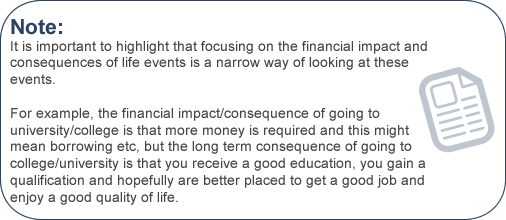Lesson 7: Investing in future
Introduction

Time:
- Single class period
Useful Links:
Introduction:
Ideally people are ready to deal with the impact and consequences of life events and circumstances, but this is not always the case. In this lesson, students will consider the financial impacts and the consequences of different life events.
Step-By-Step Instructions

Activity One: Review of Lesson 6 Homework Task
1. Invite students to think about a personal money goal. In light of their review of their completed Spending Diary, they should spend a few quiet moments writing down:
- A wish – how they might improve their spending or saving habits to achieve their money goal.
- Two stars – highlighting two things that they are already doing well in terms of their spending or saving habits.
2. Invite students to keep their ‘wish and two stars’ to help inform their reflection on the learning from this section.
Activity Two: Investing in the future
1. Tell the class that they are going to look more closely at the financial (money) impact that ‘big’ life events can have on people, i.e. if you were experiencing this life event would you need more or less money? They are also going to look at the financial (money) consequences of these ‘big’ life events, i.e. what they might have to do or how they might have to behave with regards to money as a result of these events.

2. Write a heading ‘Life Events’ on the white/blackboard and ask students to call out different life events that could influence or change their personal needs or wants. If they do not mention the following possible life events, add them onto the white/blackboard:
- Going to university/college
- Buying a car
- Getting a full-time job
- Travelling for an extended period of time
- Buying a laptop/computer/tablet
- Renting a room/apartment/house
- Buying an apartment/house
- Getting married
- Having children
- Family separating/divorcing
- Losing job/unemployment
- Becoming ill
- Becoming a carer for someone who is ill
- Retiring from work
3. Talk the class through the financial impact and consequence of one of the life events on the white/blackboard, for example the financial impact of going to university/college is that you would require more money in the short-term to pay for living expenses, books etc. (although in the longer term a qualification may mean more money and a better lifestyle). The financial consequence of going to university/college is that you might have to borrow money from family members and that you will have to manage your money well to make sure it lasts.
4. Invite the class to discuss whether more or less money is required in the case of each of the life events listed on the white/blackboard.
5. Invite the class to discuss the financial consequences of each of the life events listed on the white/blackboard.
6. Remind students that by looking only at the financial impact and consequence of life events, they have ignored some other very important impacts and consequences. For example, buying a car requires money but additional costs include insurance tax, petrol, etc. However. the benefits of being a car-owner include: the freedom you have to go where you want, when you want; being able to take a job further from where you live; or, it could even be a requirement of the job that you have your own car.
7. Conclude by highlighting that these are just possible life events and may not ever happen, but it is wise to think and plan for them nonetheless.


